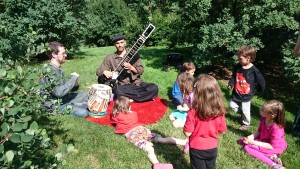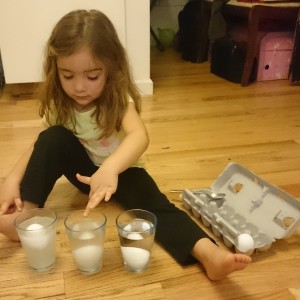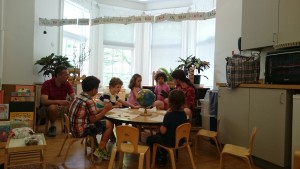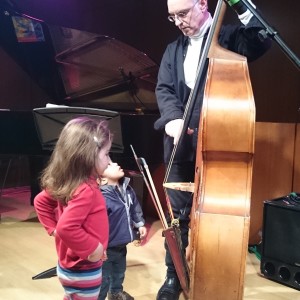( This article was published in 2015. Our reasons for homeschooling are still pretty similar, but I felt the need to mention that as our child is not 3.5 yo anymore and our path in homeschooling has evolved and grown so much in the past few years. Another updated article to come soon.)
I was a child of the school system. I loved school so much I cried on the school bus on my way home whenever we went on vacation. I was never bullied, but rather used to serve as a defender of those who gathered around me during lunch and breaks, knowing I’d keep trouble away and I had good grades. I also believe I got a pretty decent education from the massive, fully uniformed and quite strict school I attended, so it was not without a lot of reluctance that I started considering homeschooling. I was a closeted future homeschooler for a long time ( Tahra has just turned 3.5 years old), gathering data, asking questions, joining groups and testing ideas, afraid that I would have to explain myself to friends and family before I was sure myself that I was making the right choice for my baby.
That choice is made even more peculiar if you consider that I don’t fit the same, tired stereotypes. I live in the zone for one of the best public schools in NYC, I am not religious (though spiritually inclined and theologically curious), I come from a country where homeschooling is not even legal and I have absolutely no desire to shield my child from life, no matter how weird or queer. Actually, it was the desire to expose my child to much more than what I believe schools can offer that swayed me towards homeschooling.
My child is a curious, engaged, focused, strong, kind-hearted and sociable child, who is, much like other kids her age, full of questions and endless energy to explore, so the idea of sending her off at the age of 5, during these incredibly tender years, to sit in a classroom, for almost 8 hours a day (not considering the hours spent doing homework), being told to stay still and quiet without body autonomy or choices, and learning to follow as being told, without ever questioning, while preparing for standardized tests as if life asked questions in multiple choices seemed almost inconceivable to me.
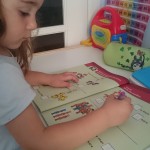
Her favorite math book. I keep them out of reach or she will try to do the whole book in one sitting.
Now, I am not against schools or tests per se. I believe that tests can be a powerful tool when used as an assessment, but not as an objective, like they have become, and I deeply admire individual teachers who make such a difference in children’s lives, even though I think the system is deeply flawed. For over 20 years, I have chosen to tutor kids, some homeschooled, from early education (from ages 3) to college students, on almost every topic such as reading and writing, math or computer sciences to quantum physics, and that has included more than plenty of test prep. I take most tests such as the SATs myself almost every year, to gather information that could benefit my students. My main objective is to bring some of the joy of learning and exploration back into their daily routines and to give them a sense of ownership over their scholastic accomplishments. I also believe a large enough number of kids are well suited for the system. Tahra is, most probably, one of the kids who would do well in a classroom. She is attentive, responsive, always finishes what she starts and loves to participate, but ironically, I don’t believe the system is good for her.
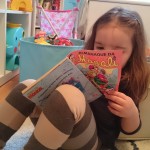 Schools are pretty good at creating uniformity and standardization, as the current system was created during the industrialized era to create factory workers and has changed very little since, but they aren’t very good at giving kids a chance to figure things out themselves or learning ahead of schedule, going deeper than the surface or offering a worldview that is not condescending or colonized. The complete current school curriculum for a year can be taught, one-on-one in 2-3 hours a day in less than 3 months, in a much more engaging way than the idiocracy of Common Core is attempting to do and according to Rudner, homeschoolers usually score in the 80 percentile higher in the same standardized tests school children take (a whole grade level ahead). Schools are also NOT, unlike common belief, particularly successful at allowing kids to socialize, especially with different age groups. Being in the same physical space is not socializing and communicating only for short bursts of time with kids exactly the same age creates a heightened and unnatural dynamic that often displays itself in school yards and cafeterias. In general (though with notable exceptions), schools fail at having a holistic approach to learning, allowing kids to use their bodies as well as their minds, dealing with ideas and questions that break the norms, giving real-life skills, teaching compassion and responsibility for the community or using our environment and cities as learning grounds.
Schools are pretty good at creating uniformity and standardization, as the current system was created during the industrialized era to create factory workers and has changed very little since, but they aren’t very good at giving kids a chance to figure things out themselves or learning ahead of schedule, going deeper than the surface or offering a worldview that is not condescending or colonized. The complete current school curriculum for a year can be taught, one-on-one in 2-3 hours a day in less than 3 months, in a much more engaging way than the idiocracy of Common Core is attempting to do and according to Rudner, homeschoolers usually score in the 80 percentile higher in the same standardized tests school children take (a whole grade level ahead). Schools are also NOT, unlike common belief, particularly successful at allowing kids to socialize, especially with different age groups. Being in the same physical space is not socializing and communicating only for short bursts of time with kids exactly the same age creates a heightened and unnatural dynamic that often displays itself in school yards and cafeterias. In general (though with notable exceptions), schools fail at having a holistic approach to learning, allowing kids to use their bodies as well as their minds, dealing with ideas and questions that break the norms, giving real-life skills, teaching compassion and responsibility for the community or using our environment and cities as learning grounds.
There is also the fact that we live in NYC (as well as at least 45000 other homeschooling families), one of the most culturally diverse cities in the world, with rich history and virtually endless opportunities for learning not only from books but by studying insects with scientists in museums or at the park with a magnifying glass, asking questions that don’t have a right or wrong answer, smelling the flowers or planting a garden at the botanical garden, stepping where millions of immigrants first landed when they came to America or learning new languages from native speakers in their own communities. A myriad of programs are available for learning math by participating in architectural projects, cooking or building Lego cities with other kids of all ages, painting and drawing at MOMA or taking lessons in Tibetan art and the intrinsic math in sand mandalas. There are ways of learning about music by going to Lincoln Center or by taking a ride on the subway with hundreds of street musicians during rush hour, practicing writing with tutors at the Superhero store or helping others by volunteering, be it at the local shelter or at the largest theater festival in the Americas. We socialize in many classes, but mostly, we spend hours in the park with other homeschoolers, where the kids create their own worlds, build their own projects, and get muddy and messy with time to enjoy those moments. And most of these can be done for free.
Why would we trade that for 8 hours in a classroom reading about it from a book with the single objective of passing a test? Because it’s what everyone does? As much as we love books (and Tahra has a very ample library already), you can’t feel, taste, smell or talk to a book, and deep understanding of complex problems is never letters a, b or c in a standardized test.
Opportunities in our world are no longer created mostly by factories, which is the model that the current school system is based on, but by creative, daring, passionate, and hardworking innovators, who are completely revolutionizing how we live, communicate and share ideas and products. I chose homeschooling because life is too exciting and layered to spend it in a classroom all day, and I want to be there with my child, to watch her discover it.
Below a few pictures from some of our adventures in the past few months.

